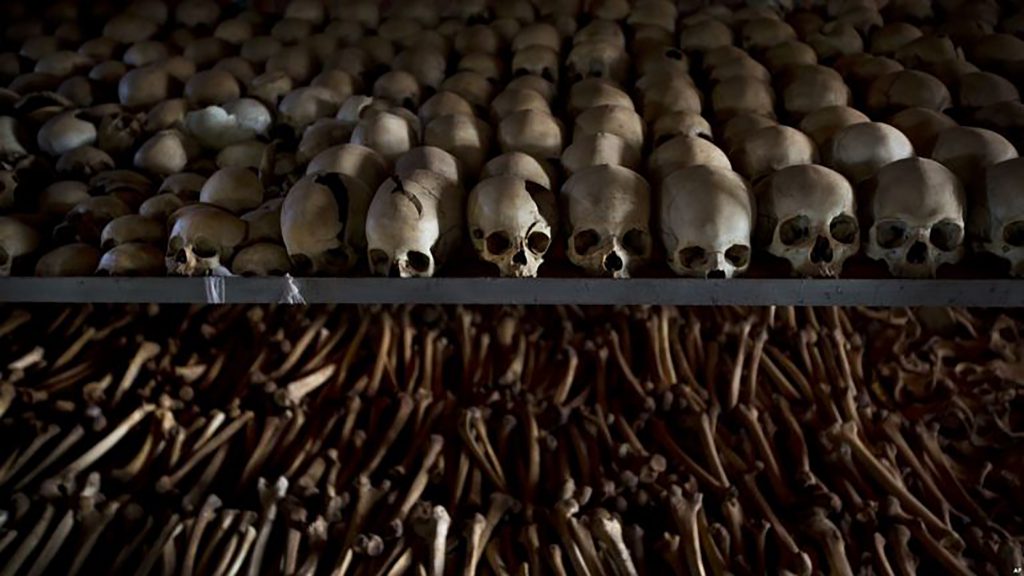In Rwanda there are two ethic groups: the Hutu, which makes up the majority of the population, and the Tutsi, the minority. Tensions between these two groups have been going on for years, so was not surprising that their conflicts would eventually escalate drastically. Despite their differences, they were actually very similar. The two groups have shared the same locations as to where they choose to live, the traditions they follow, and also the language that they speak. At a glance, they look very similar; but Tutsis tend to be taller and slimmer than the Hutus.

Hutu dislike for the Tutsi came about when the Belgians, who once dominated the region of Rwanda, considered the Tutsis to be superior to the Hutus. The Belgians gave the Tutsis better education, and even granted them better jobs than the Hutus. In 1959, a series of riots broke out in Rwanda. Many fled to Burundi, Tanzania, and also to Uganda.1 Unfortunately, 20,000 Tutsis were killed during the riots. In 1962, Belgium relinquished its power over Rwanda, and it was given its independence. The second President of Rwanda, Juvenal Habyarimana, who had been a dictator in power since 1973, and who was also a Hutu, began to lose popularity when the Hutus took over the government and the economy weakened. This is when Paul Kagame, a Tutsi, founded the Rwandan Patriotic Front (RPF) to try and overthrow the president. After much violence, the two sides, the RPF and Habyarimana, signed a peace accord in mid-1993. But on April 6, 1994, the President’s plane was shot down, killing both Habyarimana and the President of Burundi, Cyprien Ntaryamira; and things started to go badly wrong in Rwanda.
After the plane was shot down, the preexisting tensions between the Hutus and the Tutsis quickly flared up. No one knows who shot the plane down, but the Hutus quickly pointed the finger at the Tutsis. Conflict between the two neighboring tribes was nothing new in the central African nation of Rwanda, but the downing of the president’s plane was the final straw for the Hutus. Paul Kagame was accused by the leaderless Hutu government for being responsible for the plane crash and death of Habyarimana.2 Kagame denied this accusation and said that he had nothing to do with it, but news of the death of President Habyarimana spread across the country.
Shortly after the start of Rwanda’s genocide, Rwanda’s government initiated a campaign of retribution, and began to target Tutsis. In just hours, recruits from Hutu groups, government soldiers, and militias were sent to kill the Titus population, a Tutsi-minority tribe living in Rwanda. They were given radios to help them coordinate target groups of people. The recruits were sent into Tutsi cities where they started killing any Tutsi in sight with automatic weapons. For over the one-hundred days, more and more Hutus joined the killing squads, either by force of the government or voluntarily. They started to use machetes, spears, knives, and also masu, which is a thick club with nails sticking out of it. It even got to the point where everyday objects were used.3 They would have screwdrivers, bicycle handle bars, and hammers in one hand, and in the other a radio waiting to hear their next directive. They blew up churches where the Tutsi people were going into hiding to protect themselves, but the churches turned into death sites, trapping those inside when the churches were set on fire. Citizens of the Hutus were even being forced to go and kill the Tutsi people. They were given offers of food and money, and even told that could take the land of a Hutu if they killed them.

American President Bill Clinton did little to stop the massacre, even ignoring the obvious warnings about the killing that would take place after Habyarimana’s plane had crashed.4 Even other countries, like France and Belgium, along with the United States and the United Nations, knew what was about to occur, and wouldn’t take the initiative to try to stop it. For weeks these countries refused to use their moral and political authority to go against the genocidal government of Rwanda. The United States could have done much more to help out a country that was in need. Even a little bit of help would have been something, and maybe a significant number of people wouldn’t have lost their lives. While the American Congress was looking to the President to take action, Clinton was looking to the United Nations to take action. Since nothing was being done, sadly the killing just continued.
The only reason the genocide in Rwanda ended was because of the determination of the RPF. They fought back against the killing squads, and defeated the government’s soldiers. When they took control, Paul Kagame became the Vice President and Minister of Defense. With everything said and done, 800,000 Tutsi men, women, and children were killed from roughly 200,000 participants.5 There were 75,000 children that became orphans. Between 250,000 and 500,000 Tutsi women were raped, resulting in around 20,000 children being born as a result. The HIV virus and AIDS were used as another weapon, with 67% of the women that were raped being infected. If someone would have stepped up before this all unfolded, this would have been prevented and so many people wouldn’t have lost their lives or experience life changing events.
- Samantha Power, A Problem From Hell (New York: Basic Books, 2002) 342-347. ↵
- Samantha Power, A Problem From Hell (New York: Basic Books, 2002) 335-339. ↵
- Encyclopedia of Political Communication, 2008, s.v. “Rwanda Genocide, Role of Media,” by Frank Wittmann. ↵
- Samantha Power, A Problem From Hell (New York: Basic Books, 2002) 353-361. ↵
- Anna-Marie de Beer and Elisabeth Snyman, “Shadows of life, death and survival in the aftermath of the Rwandan Genocide,” Tydskrif vir Letterkunde vol. 52 issue 1 (Autumn 2015): 18. ↵



75 comments
Michael Thomas
I found this article interesting because of how it details the events led to the Rwandan genocide and the events after. I remember learning about the Rwandan genocide in my world geography course in high school. The teacher I had showed a movie called Hotel Rwanda, which details the life a man who lived through the genocide and how he and his family survived.
Marlene Lozano
I remember learning about Rwanda in school, and it is still crazy how we as Americans let the genocide continue for so long. The United States could have done a lot more to help stop the genocide, and this article helps prove that. The sad story of Rwanda’s genocide is one that will continue to be told for many more years.
Robert Rodriguez
Wow! what a great eye opening article! i found it very upsetting that no one did anything to stop these killings, the U.S, U.N, France and Belgium has the chance to prevent such actions but instead did nothing… I was completely heart broken when the statistics were mentioned. 75,000 kids don’t have parents because of hatred and possible false information… that is just heartbreaking not to mention those women that were Raped, Impregnated and given HIV/AIDS… Someone… anyone needed to intervene in this situation and shine some light on it.
Johnanthony Hernandez
To think that we are approaching 24 years since the genocide of the Tutsi, and that President Clinton, the United Nations and other nations saw the possibility for something like this to occur and did nothing to either prevent it. Whether it be out of the thought that someone else will step in and intervene or to prevent backlash from one nation placing individuals on the ground to act as peacekeepers. While the Rwandan Genocide seems to be forgotten to time due to the Bosnian Genocide being in full swing. Either way that it is looked at it, it seems to be one instance that Rwanda’s two groups could have avoided if an outside source had intervened in time to prevent the mass murder and transference of HIV and AIDS to countless innocent individuals.
Josemaria Soriano
I can’t believe how humanity has been able to destroy themselves, to fight until death, to see differences when we all are the same. Rwanda is a poor country, and in order to develop they need to be united, not separated. What surprises me the most is that there was almost null media coverage of this atrocity. I end up with this questions: if there is a population that is literally killing themselves, is it legitimate to intervene in that country even though this action is going against the sovereignty of each state? In my personal opinion, it is not only legitimate, it is an obligation to intervene.
Andrea Chavez
Reading stuff of this sort gives me the chills and not the good ones. To see that no one did anything to help these people was really sad to read as these tragedies could have been prevented or at least lessened. I think it is so sad how people can think it’s okay to send troops to kill innocent people who have no chance in fighting back. Its one of the cruelest things to do; and those poor people had no way of really defending themselves and they really were not prepared for it. It also makes me mad for those who did not help when they could have and even more to those who did all of this cruel stuff.
Alejandra Mendez
The more I read about Rwanda’s genocide, the more the tragic event saddens me. As a human being on this earth, it is shameful that we as people resort to such acts of violence towards other people amongst our own kind. You can see these acts of violence everywhere even if it is not as big in mass as the Rwandan genocide. There are constant attacks amongst different races only because of what the other looks like and because they may think that their own race is the superior race. In general, it is sad what the world has come to.
Samman Tyata
I really loved reading your article once again. No doubt, your article deserves to be nominated for an award. I really liked your featured image as well. It’s really upsetting to read that nothing was done to stop the killing of 800,000 people. This article effectively explains what exactly happened and how it affected so many lives. In closing, good job!
Jasmine Martinez
This was such a great article and it helped me learn a lot of things that I had never knew. For example I never heard of this Genocide ever in history, and It goes to show that we don’t learn everything.This was a very sad article, but very well written. I think if things could’ve been handled different we would solve conflicts so much easier. Again great article!
Alexis Renteria
Before reading this article I had little familiarity with the Rwanda genocide, but after reading this article I learned how horrible the situation was. With tensions growing more and more between the two ethnic groups it was only a matter of time before both sides fought. And the fact that the Presidents plane was shot down and was blamed on the Tutsis didn’t help the situation. It crazy how no one knows who shot down the plane and the Rwanda genocide could possibly have been avoided if no one pointed fingers.